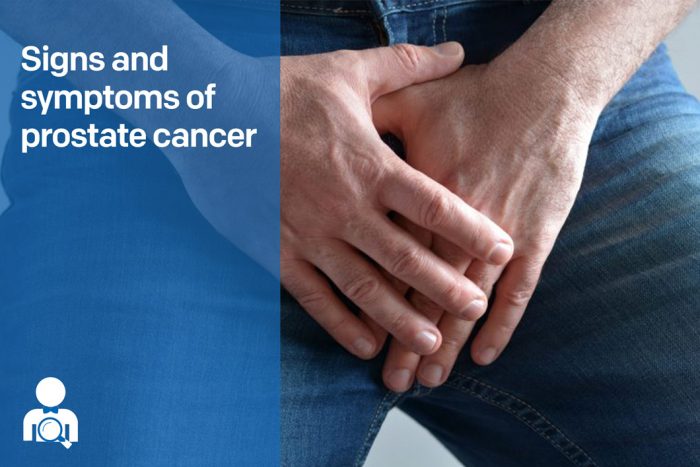It is common for prostate cancer in the very early stages to cause no symptoms due to its generally slow development. Symptoms start to appear if the cancerous tumor grows and compresses your urethra, causing changes in your urinary habits or other problems, or if your cancer is advanced.
But first and foremost, don’t panic! Because prostate cancer usually starts to grow in a different part (usually the outer part) of the prostate, early prostate cancer doesn’t often press on the urethra and cause symptoms.
These symptoms may be related to other illnesses, disorders or conditions that have nothing to do with prostate cancer.
Possible signs and symptoms of prostate cancer
- Need to urinate often, especially at night (frequent urination)
- Intense need to urinate (urgency)
- Difficulty in starting or stopping the urine flow
- Slow or intermittent urine flow
- Inability to urinate
- Burning or pain during urination
- Feeling of not having completely emptied the bladder after urination
- Difficulty in getting an erection
- Painful ejaculation
- Blood in the urine or semen (less common)
The tumor does not cause pain in the prostate itself. It can only cause symptoms, especially urinary. It should be kept in mind that all of these symptoms are usually caused by a benign enlargement of the prostate gland that occurs with age (this is benign prostatic hyperplasia – BPH) and not by prostate cancer. They can also be caused by other problems related to the urinary tract, bacterial prostatitis (urinary tract infection) or infectious (sexually transmitted infection) among others.
Although prostatitis causes the same symptoms as an enlarged prostate (BPH) and prostate cancer, it is usually accompanied by lower abdominal and back pain and chills and fever if acute.
Different signs and symptoms can appear at a later stage of prostate cancer, meaning when it is quite advanced.
What to do in the presence of these symptoms?
After the age of 40, it is important that men make sure that they do not confuse BPH, prostatitis and prostate cancer. If you have any unusual symptoms, getting medical advice is more than important to be clear.
Take the time to visit each of our pages on this website, as well as our YouTube channel, in order to get familiar with the disease with our expert lectures, our section on available resources, the support that is offered to you.
Do you have any questions or concerns? Above all, do not hesitate. Contact us at 1 855 899-2873 to discuss with a nurse specializing in uro-oncology. It’s simple and free, like all our services.
Pages of our site that might interest you
Want to know more? Just click on one of the links below.
Prostate cancer – Signs and symptoms
What is the role of a prostate
Are you at risk for prostate cancer
Screening for prostate cancer – Is it for you
PROCURE news that may interest you
Each week, we publish a blog article. Here are a few for you.
Do you know your prostate?
I have prostate pain. Is it cancer?
Prostate cancer: Did you say zero symptoms?
Written by PROCURE. © All rights reserved – 2020



 ADDITIONAL RESOURCES
ADDITIONAL RESOURCES

